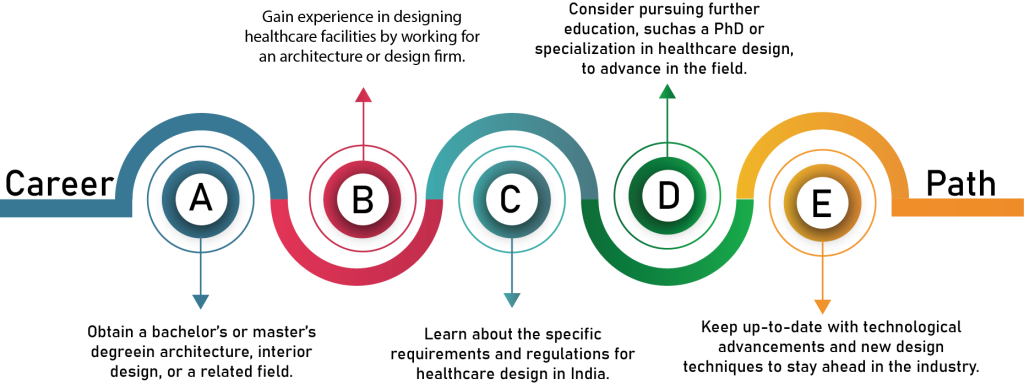A career in healthcare design involves creating spaces and products that improve the overall experience of patients, their families, and healthcare providers. This field combines elements of design, architecture, and healthcare to create environments that are functional, efficient, and aesthetically pleasing. Healthcare designers may work on projects ranging from the design of hospitals and clinics to the development of medical devices and equipment. A career in healthcare design can be rewarding as it allows professionals to use their creativity to improve the lives of others while also contributing to the advancement of medical technology.

Work description
The work of a healthcare designer can vary depending on the specific role and project. However, typical tasks may include:
- Meeting with stakeholders to understand their needs and requirements.
- Developing design concepts and proposals.
- Creating detailed design drawings and specifications.
- Coordinating with other design professionals, such as engineers and contractors.
- Reviewing and approving design submittals and shop drawings.
- Conducting site visits and inspections to ensure that the construction is proceeding according to the design.
High Demand
There is a high demand for computer engineers, as technology continues to play a crucial role in various industries.
Lucrative salaries
Computer engineering jobs typically offer competitive salaries, reflecting the high demand and specialized skills required for the job.
Opportunities for innovation
Computer engineering is a field that is constantly evolving, providing opportunities for professionals to work on cutting-edge technologies and drive innovation.
Versatility
Computer engineering skills are applicable in a wide range of industries, including software development, hardware design, telecommunications, and more.
Flexibility
Computer engineers may have the option to work remotely or on a flexible schedule, depending on the job and employer
Job satisfaction
Many computer engineers find the work challenging and rewarding, as they have the opportunity to solve complex problems and make a significant impact in their field.
High stress
The fast-paced and constantly evolving nature of the field can create high stress levels, especially when working on complex projects with tight deadlines.
Long hours
Computer engineers may be required to work long hours, especially during critical project phases or when troubleshooting issues.
Competitive field
Due to the high demand for computer engineering jobs, the field can be highly competitive, requiring candidates to have specialized skills and experience.
Constant learning
Computer engineers must constantly stay up-to-date with the latest technologies and advancements in the field, which requires ongoing learning and professional development.
Isolation
Depending on the job and work environment, computer engineers may spend a lot of time working independently or in small teams, which may not be suitable for everyone.
Eye strain and other physical health issues
Staring at computer screens for long periods of time can cause eye strain and other physical health issues, such as back pain and repetitive strain injuries.
A career in healthcare design typically requires a degree in architecture, interior design, or a related field, which can be a significant investment in time and money. As the healthcare industry in India continues to grow, the demand for skilled healthcare designers is increasing, providing a promising investment opportunity.
The earning potential for healthcare designers in India can vary depending on factors such as education, experience, and job location. In general, healthcare designers can earn a competitive salary in India, with the potential to increase with career advancement and specialization.
Strong empathy and understanding of the needs of patients and healthcare providers
Creativity and ability to think outside the box to find innovative solutions
Creativity and innovation.
Attention to detail and ability to manage complex projects
Good communication and teamwork skills
Strong foundation in math and science.
Limited experience or knowledge in healthcare or design
Difficulty in balancing design aesthetics with practicality and functionality in a healthcare setting
Limited ability to adapt to changes in healthcare regulations and technology
Inadequate math and science skills.
Limited knowledge of patient safety and infection control protocols
Tendency to procrastinate or miss deadlines.
Work-life balance
The work life balance in healthcare design can be challenging, as the work can be time consuming and demanding, with tight deadlines and long hours. They should prioritize their health and personal life alongside their professional responsibilities. Effective time management and setting boundaries can help achieve this balance. It is also important to engage in stress-reducing activities such as exercise, meditation, and hobbies. Establishing a supportive work environment, promoting team collaboration, and delegating tasks can also help maintain work-life balance.

Healthcare designers have a significant impact on the lives of patients, healthcare providers, and communities.
the quality of care and help patients recover more quickly. They can also help healthcare providers work more efficiently and effectively, reducing stress and improving job satisfaction.
Additionally, healthcare facilities play a vital role in the communities they serve, and healthcare designers can contribute to the wellbeing of these communities by creating attractive, functional, and sustainable spaces.
Artificial Intelligence Machine Learning
Involves developing algorithms that enable machines to learn from data and make decisions without human intervention.
Cyber security
Focuses on protecting computer systems, networks, and sensitive data from unauthorized access, attacks, and theft.
Software Engineering
Involves designing, developing, and maintaining software applications and systems.
Data Science Machine Learning
Involves processing, analyzing, and interpreting large and complex data sets using statistical and computational methods.
Computer Networks
Focuses on designing, implementing, and maintaining computer networks that enable communication and data transfer between devices.
Conclusion:
In Conclusion, pursuing a Health care in India requires a Strong Foundation in math and science, a passion for technology, and a willingness to continuously learn and adapt to New Developments in the industry. With competitive salaries, opportunities for career growth, and the potential to make a significant impact on society, computer engineering can be a Rewarding and Fulfilling Career choice for those who are up for the challenge.



